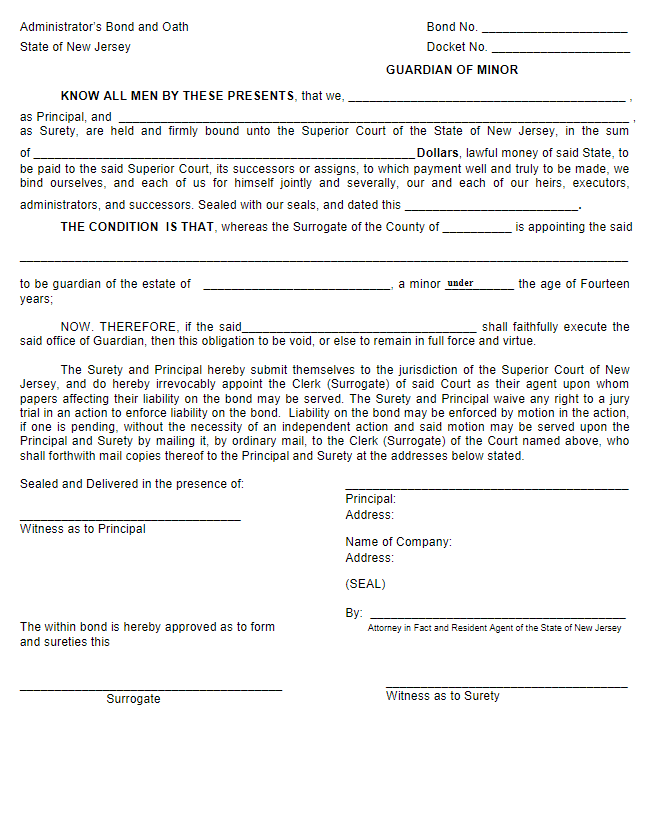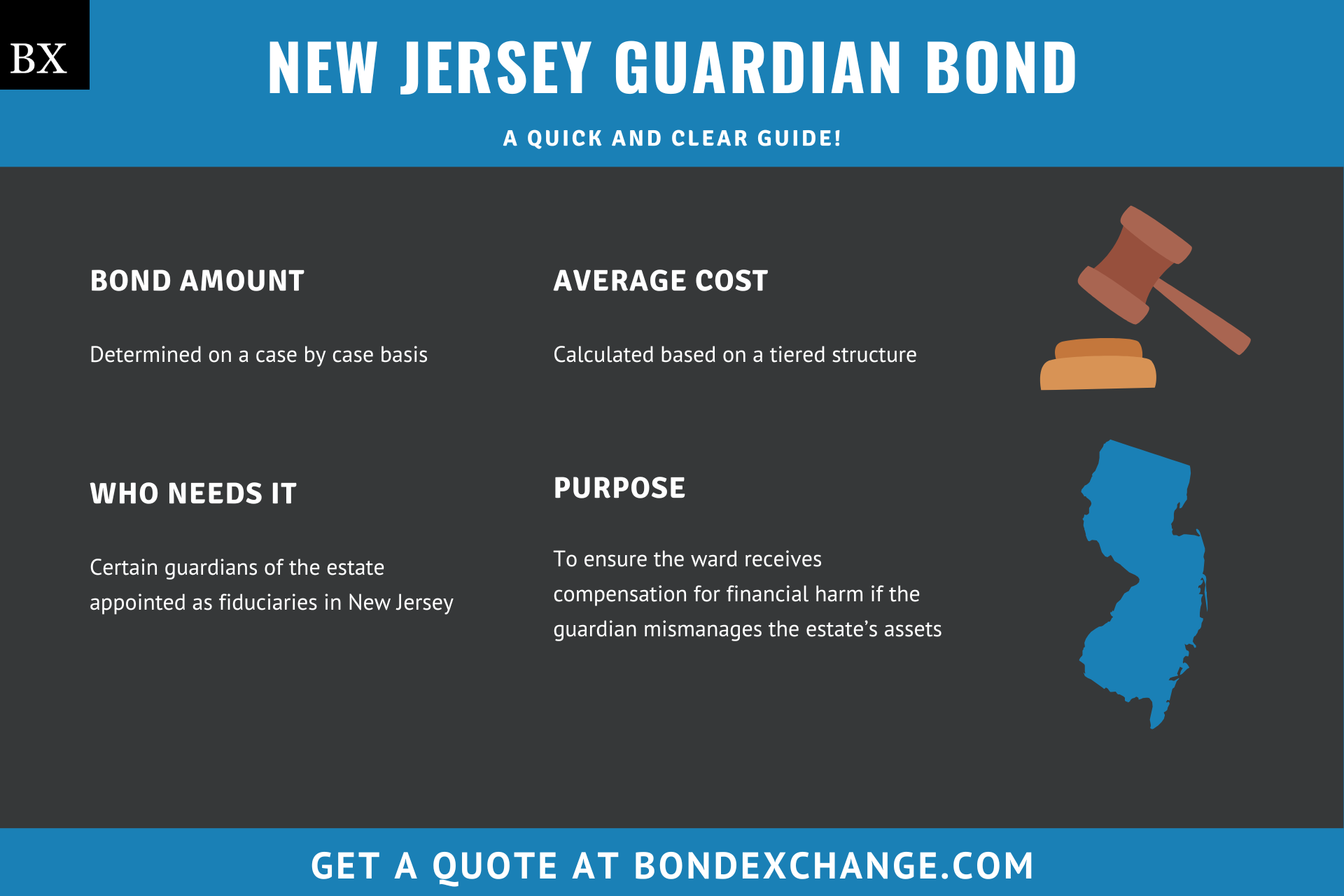New Jersey Guardian Bond: A Comprehensive Guide
This guide provides information for insurance agents to help their customers obtain a New Jersey Guardian bond.
At a Glance:
- Average Cost: Calculated based on a tiered structure
- Bond Amount: Determined on a case-by-case basis (more on this later)
- Who Needs It: Certain guardians of the estate appointed as fiduciaries in New Jersey
- Purpose: To ensure the ward receives compensation for financial harm if the guardian mismanages the estate’s assets
- Who Regulates Guardian Bonds in New Jersey: The superior court and the county surrogate in the county where the ward resides or has property

Background
New Jersey Statutes 3B:12-19 and 3B:12-25 require all guardians to be appointed by a court before assuming their fiduciary duties. The New Jersey legislature enacted the appointment requirement to ensure guardians act in the ward’s best interests when making decisions related to their welfare or managing their estate. To provide financial security for the enforcement of this requirement, certain guardians must purchase and maintain a probate surety bond before becoming appointed as a fiduciary.
What is the Purpose of the New Jersey Guardian Bond?
New Jersey requires certain guardians to purchase a surety bond as a prerequisite to being appointed as a fiduciary. The bond ensures that the ward will receive compensation for financial harm if the guardian fails to abide by the regulations outlined in New Jersey Statutes 3B:15-1 through 3B:15-7. Specifically, the bond protects the ward if the guardian fails to adhere to all court orders or mismanages the estate’s assets.
For example, if a guardian uses money from the ward’s bank account to pay for the guardian’s personal expenses or mixes the estate’s funds with their own, the ward can file a claim against the guardian’s bond to recoup their losses. In short, the bond is a type of insurance that protects the ward if the guardian does not fulfill their fiduciary duties.
How Can an Insurance Agent Obtain a New Jersey Guardian Bond?
BondExchange makes obtaining a New Jersey Guardian bond easy. Simply log-in to your account and use our keyword search to find the “Guardian” bond in our database. Don’t have a login? Gain access now and let us help you satisfy your customers’ needs. Our friendly underwriting staff is available by phone (800) 438-1162, email or chat from 7:30 AM to 7:00 PM EST to assist you.
At BondExchange, our 40 years of experience, leading technology, and access to markets ensures that we have the knowledge and resources to provide your clients with fast and friendly service whether obtaining quotes or issuing bonds.
Not an agent? Then let us pair you with one!

Click the above image to find a BX Agent near you
How is the Bond Amount Determined?
New Jersey Statute 3B:15-1 grants the court the authority to determine the required bond amount on a case-by-case basis. However, the court must take into consideration the estate’s value as well as the extent of the guardian’s authority over the estate when setting the amount. Additionally, the guardian may petition the court the reduce the bond amount or waive the requirement altogether.
What are the Underwriting Requirements for the New Jersey Guardian Bond?
Most surety companies will examine the following factors when determining eligibility for the New Jersey Guardian bond:
- Guardian’s credit history
- Whether or not the estate has an attorney
- Whether or not the guardian is a family member
- The guardian’s occupation
- Whether or not the guardian is replacing a prior fiduciary
- If the guardian has ever committed a felony
- Whether or not there is any ongoing business in the estate
- If a creditor is requiring the bond
- If the bond amount is greater than or equal to the estate’s value
How Much Does the New Jersey Guardian Bond Cost?
Surety companies typically determine the premium rate for Guardian bonds based on a tiered structure, so larger bond amounts will be charged a lower premium rate than smaller bonds. New Jersey allows guardians to pay for the bond premium with estate funds.
The following table illustrates the pricing structure for the New Jersey Guardian bond:
$1,500,000 Guardian Bond Cost
| Bond Amount | Premium Rate | Total Bond Cost |
|---|---|---|
| First $20,000 | 0.75% | $150 |
| Next $40,000 | 0.60% | $240 |
| Next $140,000 | 0.50% | $700 |
| Next $300,000 | 0.375% | $1,125 |
| Next $1,000,000 | 0.25% | $2,500 |
| Total cost of $4,715 |
Who is Required to Purchase the Bond?
New Jersey requires certain guardians to purchase a surety bond as a prerequisite to becoming a court-appointed fiduciary. To paraphrase New Jersey Statutes 3B:1-1 and 3B:1-2, a “guardian” is an individual or organization appointed as a fiduciary over a ward’s person and/or estate. Additionally, a “ward” is defined as a minor or incapacitated adult for whom guardian is appointed that is judged incapable of making sound decisions concerning their estate and/or well-being.
There are different kinds of guardianships available for both incapacitated adults and minors in New Jersey, as outlined below:
- Guardian of the Person: A guardian authorized to take custody of and provide care for a ward, including making medical and personal decisions on their behalf.
- Guardian of the Estate: A guardian with legal control over the finances and property of a ward, such as paying bills and making investments.
- Guardian of the Person and the Estate: A guardian responsible for the care of a ward and the legal control of a ward’s estate.
Guardians are not required to purchase a surety bond, unless explicitly required by the court, in the following situations:
- The guardian is of the person only, not the estate
- The total value of the estate’s real and personal assets have a net value of less than $25,000
- The person seeking appointment is a family member within the third degree of consanguinity
- The court determines that a bond is not necessary to protect the estate’s assets
- The guardian is nominated under a written will or power of attorney and the will specifically waives the bond requirement

How do New Jersey Guardians Become Appointed as Fiduciaries?
Guardians in North Dakota must navigate several steps to become appointed as fiduciaries. Below are the general guidelines for guardians of adults only, as each guardianship case for minors comes with its own unique appointment process and must be addressed individually. Appointees should refer to the appointment statutes or the New Jersey Court’s website for details on the process.
Step 1 – Hire an Attorney
Although not explicitly required, it is highly recommended that guardians hire an attorney to assist with the guardianship process.
Step 2 – Determine Priority
Priority to serve as guardian will be given in the following order:
-
- The spouse or domestic partner of the incapacitated adult
- The incapacitated person’s heirs or friends
- The Office of the Public Guardian for Elderly Adults
- Any other person determined suitable by the court
Step 3 – File All Required Forms
Persons seeking guardianship over an incapacitated adult must file a petition for appointment with the county surrogate in the county where the adult resides or has property. Petitioners can obtain the necessary forms online here or from the court, and must ensure they submit the following items:
-
- Adult Guardianship Case Information Sheet
- Verified Complaint Form
- Certification of Phyisician or Psychologist
- Certification of Assets
- Certification of Criminal and Civil Judgment History
- Order Fixing Guardianship Hearing Date
- Judgement of Incapacity and Appointment of Guardian
The incapacitated adult must be examined by two medical professionals to certify their alleged incapacity within 30 days of filing. Petitioners must pay a $200 filing fee to begin a guardianship case, and can reference the state’s guardianship packet for more information on the filing process.
Step 4 – Notify the Appropriate Parties
After submitting the required items to the court, petitioners must notify all of the interested persons listed in the petition. The notice must include a notice of the hearing along with a copy of the petition, and the petitioner must arrange for the ward to be served personally.
Step 5 – Attend a Hearing
Guardians must attend a hearing conducted by the superior court of the county where the ward resides and present evidence as to why they are in need of guardianship. The court will examine the evidence presented by the guardian as well as that presented by the ward being evaluated (if any) and make a determination as to whether or not guardianship is necessary.
Any interested person can apply to the court to participate in the hearing. If the court finds a basis for the appointment, it will complete the judgement of incapacity and appoint the guardian.
Step 6 – Purchase a Surety Bond
Unless otherwise exempt, guardians of a minor must purchase and maintain a surety bond (limits outlined above).
Step 7 – Qualify with the County Surrogate
Court-appointed guardians must qualify with the county surrogate after being appointed by the court. The guardian needs to affirm their willingness and ability to act as guardian, and file their surety bond if required to obtain one. Once they qualify, they receive Letters of Guardianship, which authorizes the guardian to begin fulfilling their fiduciary duties.
How do New Jersey Guardians File Their Bonds?
Guardians should file their completed bond forms, including the power of attorney, to the clerk of the superior court of the county where the ward resides.
The surety bond requires signatures, including witness signatures, from the surety company that issues the bond, the applicant, and the county surrogate. The surety company should include the following information on the bond form:
- Legal name and address of the entity/individual(s) buying the bond
- Surety company’s name and address
- Legal name and age of the ward
- Bond amount
- Docket number
- Date the bond is signed
What can New Jersey Guardians do to Avoid Claims Made Against Their Bonds?
To avoid claims against their bonds, guardians in New Jersey must ensure that they:
- Perform all of their fiduciary duties
- Obey all court orders
- Do not mismanage the estate’s property
